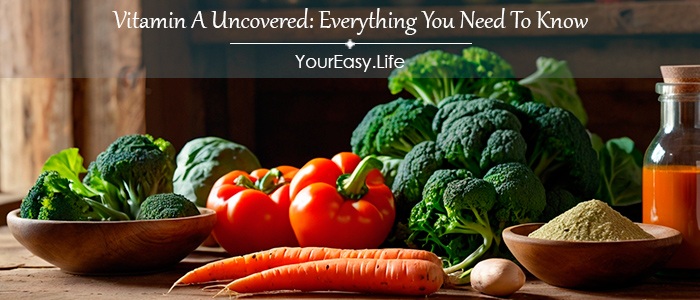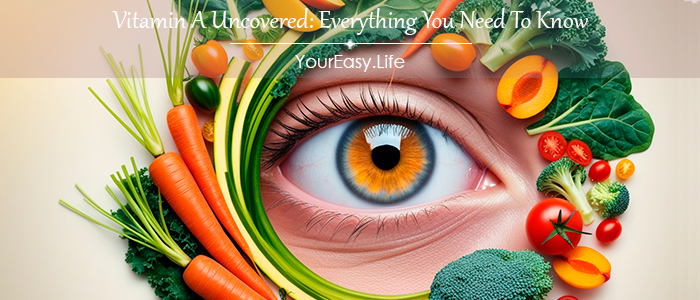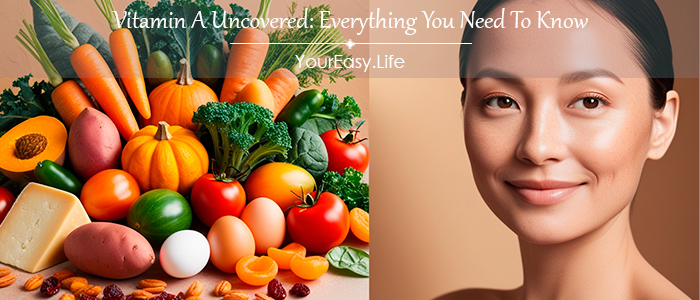Welcome to our in-depth guide on vitamin A — an essential nutrient that plays a crucial role in everything from your vision and immune health to skin integrity and reproductive function. Whether you’re curious about the benefits, potential risks, or the best sources of this vital vitamin, this article will provide you with all the answers you need. If you’re looking to understand how to maintain the right balance of vitamin A in your diet and lifestyle, you’ve come to the right place. Let’s dive in and uncover everything you need to know about vitamin A!
Table Of Contents
- What Is Vitamin A?
- Why Is Vitamin A Important For The Body?
- How Do I know If I’m Lacking Vitamin A?
- Sources Of Vitamin A: Which Foods Contain It?
- How Much Vitamin A Do I Need Daily?
- How Does Vitamin A Interact With Other Nutrients?
- What Vitamin A Supplements Are Available?
- What Are The Dangers Of Vitamin A Deficiency?
- What Are The Dangers Of Excess Vitamin A In The Body?
- Conclusion
What Is Vitamin A?
Vitamin A is a fat-soluble vitamin that exists in two primary forms: retinol and carotenoids. Retinol is the active form that we get from animal products like liver and dairy. It is readily available to our bodies and begins to work almost immediately.
On the other hand, carotenoids, such as beta-carotene, are found in plant-based foods like carrots and spinach. Beta-carotene is a provitamin that our bodies convert into retinol. This process occurs in the intestines and liver, where beta-carotene is first split into two molecules of retinal, which is then converted into retinol. It’s important to note that this process is regulated by the body itself: it converts beta-carotene into vitamin A only in the amount needed, preventing overdose. Thus, beta-carotene is a safe source of vitamin A, especially when consumed in plant-based foods.
However, the body’s ability to convert beta-carotene can vary depending on genetic factors, diet, and overall health. For some people, this conversion may be less efficient, requiring an increased intake of foods rich in carotenoids or the use of supplements. This may be particularly important for vegetarians and vegans to maintain health without the risk of toxicity.
Why Is Vitamin A Important For The Body?
Imagine your body as a complex machine, where each element has its unique function. Vitamin A is one of those elements that is responsible for a number of critically important tasks. It helps us see in the dark, strengthens the immune system by protecting us from infections, and supports skin health by aiding in its restoration. But that’s not all. It is also necessary for the normal functioning of the reproductive system and embryonic development. So, if you want to maintain your health at a high level, be sure to monitor your vitamin A levels.
How Do I know If I’m Lacking Vitamin A?
Sometimes we don’t notice that our body is missing an important vitamin until we start to feel discomfort. For example, if your night vision has worsened, your skin has become dry and flaky, and infections have become frequent guests, these could be the first signs of vitamin A deficiency. In such cases, it is important not to ignore the signals your body is sending but to consult a doctor for a blood test. This is the only way to accurately determine whether you are deficient in vitamin A and, if so, take the necessary steps.

Sources Of Vitamin A: Which Foods Contain It?
The good news is that vitamin A can be found in a variety of foods available in our daily diet: beef liver — a true champion in retinol content, orange and yellow vegetables (carrots, pumpkin, sweet potatoes), leafy green vegetables (kale, spinach, broccoli), red bell peppers, tomatoes, mangoes, apricots, eggs, cheese, butter, and milk all contain retinol, and fish oil is one of the best sources of retinol. Some fortified foods also provide a good source of vitamin A.
Does Cooking Affect Vitamin A Levels In Foods?
Cooking can either improve or reduce the bioavailability of vitamin A. For example, cooking carrots with a little olive oil helps the body better absorb beta-carotene. However, prolonged boiling or frying can reduce its content in food. So, if you want to get the most benefit, cook your vegetables wisely.
How Much Vitamin A Do I Need Daily?
The recommended daily allowance for men is about 900 micrograms of retinol equivalents (RE), while for women, it is 700 micrograms RE. These numbers can vary depending on age, gender, and overall health. For example, pregnant and breastfeeding women need more vitamin A to support their health and the proper development of their baby.
Can I Get Enough Vitamin A From My Diet Alone?
If your diet is balanced and includes a variety of foods, you can probably get the necessary amount of vitamin A without supplements. However, if you’re a vegetarian or vegan, it’s important to be especially mindful. Plant-based sources like carrots, spinach, and sweet potatoes contain carotenoids, which need to be converted into the active form. If it’s difficult for you to get enough vitamin A from food alone, supplements might be a good option, but only under a doctor’s supervision.
Can I Get Too Much Vitamin A From Food?
You’ve probably heard the saying, “everything in moderation,” and it applies to vitamin A as well. This is especially important for those who consume foods high in retinol, such as liver. Excess vitamin A can lead to toxicity, manifesting as headaches, nausea, dry skin, and even liver damage. So, if you consume such foods frequently, be careful and don’t exceed the recommended levels.
How Can I Include More Vitamin A In My Diet?
It’s easier than you might think. Start by incorporating foods rich in retinol and carotenoids into your daily diet. For example, prepare an omelet with spinach and cheese for breakfast, a salad with carrots and kale for lunch, and baked sweet potatoes for dinner. Remember that adding a small amount of fat, such as olive oil, will help your body better absorb the carotenoids.
How Does Vitamin A Interact With Other Nutrients?
Vitamin A doesn’t work alone — it interacts with other nutrients like iron, zinc, and vitamin D. For instance, vitamin A helps improve iron absorption, which is important for preventing anemia, and supports the immune system along with zinc. However, be careful: too much vitamin A can lower vitamin D levels, which can negatively impact bone health. Therefore, it’s important to maintain a balance and ensure that all vitamins and minerals are consumed in the right amounts.
What Vitamin A Supplements Are Available?
If you decide to take vitamin A supplements, it’s important to understand which ones are best suited for your body. There are two main types of supplements: retinol and beta-carotene. Retinol is the active form of vitamin A that is immediately absorbed by the body. Beta-carotene, on the other hand, is a provitamin that the body converts into the active form as needed. If you are a vegetarian or vegan, choose beta-carotene supplements, as they are safer and less likely to cause overdose.
How To Properly Take Vitamin A Supplements?
Taking supplements requires careful consideration. It’s best to take them with meals, especially if the food contains fats, as vitamin A is fat-soluble and is better absorbed with fats. It’s important not to exceed the recommended dosage, as an excess can be toxic. If you choose beta-carotene supplements, the risk of overdose is minimal, but it’s still wise to follow your doctor’s recommendations.
Are There Any Side Effects From Taking Vitamin A Supplements?
Like any other vitamins, vitamin A can cause side effects, especially if taken in large doses. Symptoms of overdose include headaches, nausea, dry skin, and even liver problems. If you are taking vitamin A supplements and notice any of these symptoms, stop taking them immediately and consult a doctor.
Is It Safe To Take Vitamin A With Other Vitamins And Supplements?
Vitamin A interacts with other vitamins and supplements, and it’s important to consider this when planning your intake. For example, it helps with the absorption of iron, but an excess of vitamin A can lower vitamin D levels, which may negatively affect bone health. If you are taking several supplements simultaneously, it’s best to consult a doctor to avoid potential negative interactions and overdose.

What Are The Dangers Of Vitamin A Deficiency?
A deficiency in vitamin A can lead to serious health problems. One of the most well-known symptoms is night blindness, where a person has difficulty seeing in low light conditions. Vitamin A deficiency also weakens the immune system, making the body more susceptible to infections. Dry skin and mucous membranes are other symptoms of a deficiency. In severe cases, especially in children, a deficiency can lead to stunted growth and even increased mortality.
What Causes Vitamin A Deficiency?
Vitamin A deficiency is most commonly caused by insufficient intake of foods rich in this vitamin or by impaired absorption. People with gastrointestinal diseases such as celiac disease, Crohn’s disease, or chronic pancreatitis, which can interfere with the body’s ability to efficiently absorb fat-soluble vitamins, often struggle with vitamin A absorption. Children, pregnant women, and people following diets low in fat-soluble vitamins are also at risk.
How Is Vitamin A Deficiency Diagnosed?
The diagnosis of vitamin A deficiency usually begins with an assessment of symptoms such as night blindness and dry skin. A doctor may order a blood test to measure the level of retinol in the plasma. If it is below normal, the doctor may recommend dietary changes or starting supplements.
Who Is At Risk for Vitamin A Deficiency?
Children and pregnant women in developing countries, where access to foods rich in vitamin A is limited, are at higher risk of vitamin A deficiency. People with conditions that impair nutrient absorption may also be deficient. It is important to ensure that vitamin A levels are within the normal range, especially if you belong to one of these groups.
How Can I Prevent Vitamin A Deficiency?
To prevent vitamin A deficiency, it is important to regularly include foods rich in this vitamin in your diet or take supplements if necessary. For vegetarians and vegans, it is particularly important to consume sufficient amounts of carotenoids from plant sources such as carrots, pumpkin, and spinach. If you have problems with vitamin A absorption, you should discuss the possibility of taking special supplements with your doctor.
What Are The Dangers Of Excess Vitamin A In The Body?
While vitamin A is essential for our health, too much of it can be toxic. Excessive consumption of retinol, especially from supplements, can lead to hypervitaminosis, which manifests as headaches, nausea, dry skin, and even liver damage. It is important to monitor your intake to avoid exceeding the recommended dosages, especially if you are already getting vitamin A from your diet.
Conclusion
As we wrap up our exploration of vitamin A, it’s clear that this essential nutrient plays a vital role in maintaining our health, from supporting vision and immune function to ensuring skin health and proper growth. Balancing your intake through a well-rounded diet rich in both retinol and carotenoid sources is key. Whether you’re considering supplements or adjusting your diet, always consult with a healthcare professional to ensure you’re meeting your body’s needs without overdoing it.
Remember, taking proactive steps in your nutrition journey can lead to lasting health benefits. At YourEasy.Life, we’re here to support you every step of the way – because your health is our priority!
Scientific Research, Data And Articles
- National Institutes of Health (NIH): Vitamin A and Carotenoids Fact Sheet for Health Professionals
- Vitamin A – The Nutrition Source
- World Health Organization (WHO): Vitamin A Supplementation
- Vitamin A deficiency and its consequences
- The vitamin A spectrum: from deficiency to toxicity
- Vitamin A: biomarkers of nutrition for development





